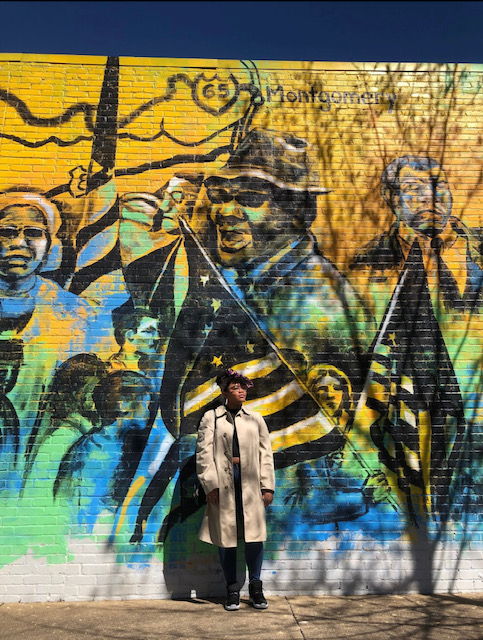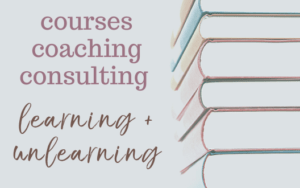This post introduces Alexa Eason, Georgetown senior and intern with Heart Head Hands, as she talks about her internship projects, semester goals, and commitments.
This post also introduces a new series of interviews aimed at sharing projects related to social, racial, and environmental justice *and* asking others the question that runs through this blog: “How do you strive toward everyday living for justice?”
In future Q&A posts, we’ll learn about embodied healing practices, justice-oriented research, and organizations interrupting the status quo. If you’d like to recommend someone to be interviewed, please reach out.
Without further ado, here’s Alexa Eason, who’s inspired this new interview series and is breathing life into Heart-Head-Hands.com this fall semester.

Photo of Alexa Eason standing against a mural on the Civil Rights Trail in Montgomery, Alabama.
Tell us about yourself.
My name is Alexa Eason, and I’m from Connecticut. I am currently a senior at Georgetown University, majoring in African American Studies and graduating in spring 2020. This semester I’m participating in a new Georgetown program, called the CALL, or Capitol Applied Learning Lab, which allows students to take classes and live downtown, while having an internship somewhere in DC. We’re able to experience the city and get beyond Georgetown’s campus, which can feel like a bubble.
Why did you choose to work with Heart Head Hands?
When I applied to the CALL, I noticed Heart Head Hands, LLC on the internship spreadsheet and could not resist applying after looking at the website and seeing what the organization is all about. I felt called to be a part of something where the solutions for social justice start with one’s heart and manifest outward into the work being done through action.
This is closely aligned with the work I do on campus at Georgetown. I am in a living learning community called the Women’s STAND House: a community where we work to create a safe and brave space for first-generation low-income students to relax, reflect, and be surrounded by people who are passionate about bridging the gap between students with different backgrounds.
I also knew I wanted to join Heart Head Hands after our interview and hearing why you (Beth) started this organization. I could tell this is not just a job for you, but is your life. This ignited questions I ask myself about how people position themselves and understand their position in the world. Furthermore, it’s important that I work alongside someone who has similar passions to me.
What contribution would you like to make?
This semester I am hoping to shake things up and help the organization expand toward having a wider impact. I want to exercise and strengthen a lot of my skills—from advertising and planning events to writing different materials.
So far, I’ve been improving my writing skills through providing feedback and writing this post. I’ve also come up with the grand idea of helping other students focus on what we need in this moment: recharging and reflecting toward living out an everyday commitment to justice. This plan has me co-facilitating with Beth an event on November 2nd titled “How Do You STAND?” Stay tuned to see what else Beth and I have in store!

How do you strive toward “everyday living for justice”?
I remind myself often that my decisions and actions influence change in the world. Change does not have to be equated to what is big, as if smaller gestures do not matter. Instead, I constantly throw pebbles out into the world, allowing the ripples of change to move outward. This can be seen in my everyday work: from my major and internships to reflecting on who I am, what I stand for, and how I understand my position in the world. All of these pebbles, varying in size and impact, add up to how I strive toward “everyday living for justice.”
For instance, this semester along with working with Heart Head Hands, I’m interning with the Smithsonian Center for Folklife and Cultural Heritage. At the Smithsonian, I am working on the 2020 Folklife Festival and one of its focus locations—Benin, Africa—with special attention to traditional knowledge and environment. The overarching theme of the festival for 2020 is Vodun. My research has me into looking at the last slave ship to land in the United States—The Clotilda—while analyzing the environmental impact that development has had on Africatown.
This semester, while at the CALL, I am also taking a full course load. One of my most cherished courses is called Prisons and Punishment, which I take at the DC jail with people who are currently imprisoned: “awaiting trial, serving short sentences, or preparing to return to their communities after a longer period of incarceration with the Bureau of Prisons (BOP).” I am able to hear and see personal anecdotes from those the system affects most cruelly. Through the course, I’m learning about the criminal justice system in a different light: one that continues to be disheartening and calls me to create change.
I realize this semester that my courses and internships speak to different interests of mine, highlighting the themes of activism, government surveillance, and legacies and histories of (in)justice. These interests have pushed/pulled me into DC, and now I’m experiencing the city I cannot wait to live in. I look forward to the ongoing journey of learning the deep, under-recognized, yet compelling histories of marginalized communities.
—
This interview is conducted by Beth Godbee, Ph.D. with Alexa Eason for Heart-Head-Hands.com. Look for future interviews and a new events page—both coming soon, thanks to Alexa’s input this semester.
You can also support the work through Patreon, where you’ll find additional monthly content. And consider subscribing to the newsletter and liking this blog on FB. Thanks!



Leave a Reply